White-label NFT domain marketplaces are revolutionizing how brands establish a strong Web3 presence. By leveraging customizable, ready-to-deploy platforms, brands can quickly launch their own NFT domain marketplaces, ensuring full control over branding and customer experience. This guide explores the concept, strategic benefits, key features, and integration opportunities that empower brands to succeed in the decentralized digital economy.
As blockchain domains become a cornerstone of Web3 branding strategies, understanding white-label solutions is essential for brand managers, digital marketing leads, and Web3 entrepreneurs aiming to differentiate themselves in a competitive market. This comprehensive guide addresses all critical questions and provides actionable insights for launching and optimizing white-label NFT domain marketplaces.
Table of Contents
- Introduction
- What is a White-Label NFT Domain Marketplace?
- Why Should Brands Use a White-Label NFT Domain Marketplace?
- Key Features Every White-Label NFT Domain Marketplace Must Have
- How Web3 Keyword Staking Drives Marketing Visibility
- Multi-Chain Marketplace Aggregators: The Future-Proof Solution
- Success Story: How Brands Thrive with White-Label NFT Domain Marketplaces
- Frequently Asked Questions (FAQ): White-Label NFT Domain Marketplaces for Brands
- Conclusion
What is a White-Label NFT Domain Marketplace?
A white-label NFT domain marketplace is a customizable platform that allows brands to create their own NFT domain marketplaces without building the infrastructure from scratch. These platforms include essential features such as domain minting, listing, buying, and selling, all under the brand’s identity. They enable rapid deployment with multi-chain support, secure transactions, and user-friendly interfaces that cater to brand-specific needs.
Such marketplaces empower brands by providing security, scalability, and flexibility, reducing development time and cost while allowing brands to leverage existing blockchain domain technology. They are ideal for companies aiming to enter the NFT domain space quickly with a solution that balances technical robustness and branding control.
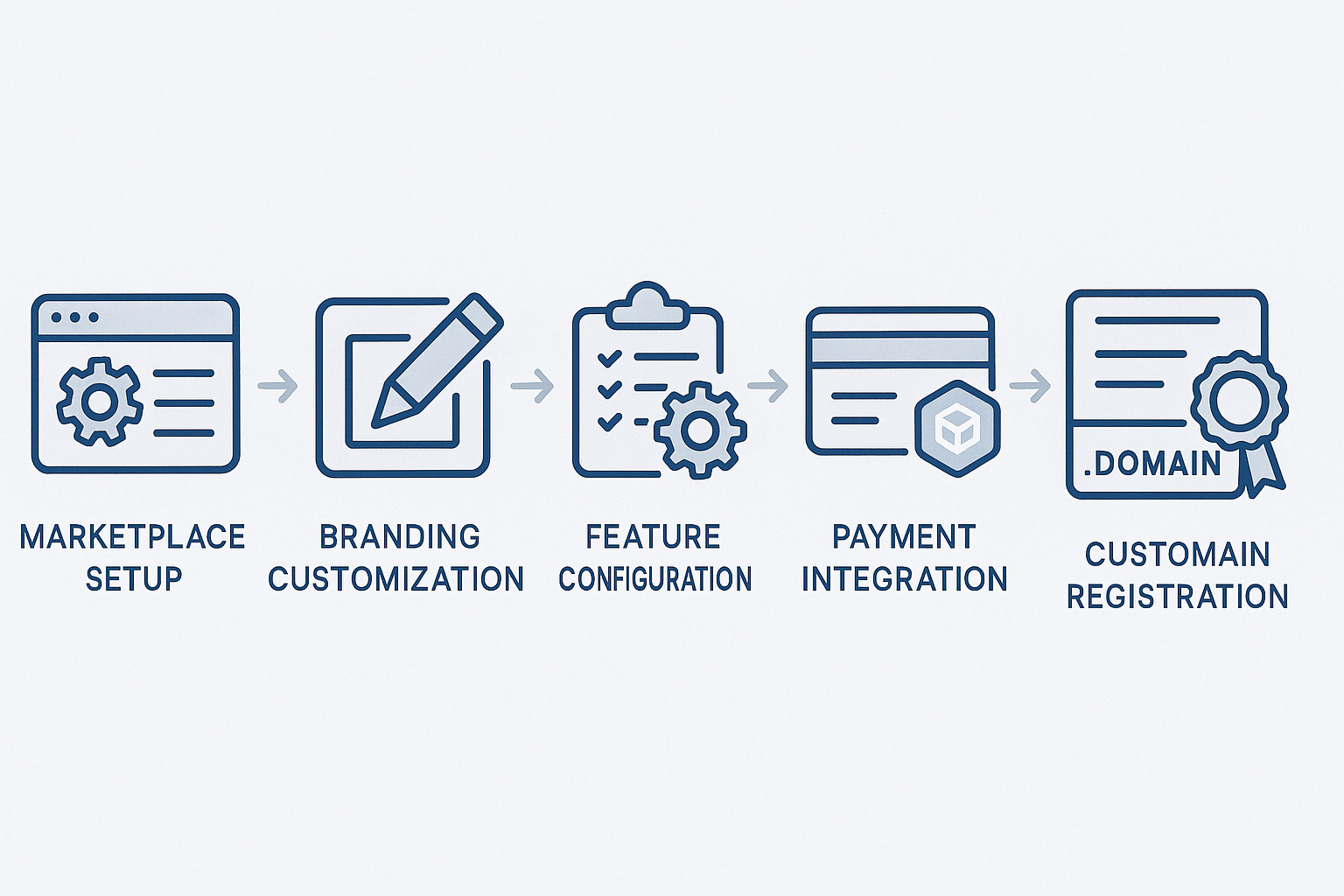
White-label NFT domain marketplaces combine the utility of blockchain domains with tailored marketing tools to create a unique decentralized branding experience for businesses in the Web3 ecosystem.
Understanding White-Label NFT Domain Marketplaces
White-label NFT domain marketplaces allow brands to launch their own domain trading platforms with full customization and control. These solutions include features like escrow services, wallet integration, and multi-chain support, enabling brands to provide seamless user experiences while maintaining their unique identity.
How White-Label NFT Domain Solutions Work
The process to deploy a white-label NFT domain marketplace involves partnering with a solution provider that offers customizable platforms. After selecting the provider, brands customize the marketplace’s branding elements such as logos, themes, and UI. The platform is configured to support domain minting, trading, auctions, and escrow. Integration with payment gateways and user verification systems follows, ensuring compliance and security. This streamlined process enables brands to enter the market swiftly with minimal technical overhead.
Why Should Brands Use a White-Label NFT Domain Marketplace?
Brands benefit from white-label NFT domain marketplaces by gaining enhanced branding control and faster time to market. These platforms provide a censorship-resistant web presence, reinforcing trust and authenticity among customers. By leveraging decentralized domain solutions, brands ensure their digital identities are secure and tamper-proof.
The strategic advantages include retention of customer loyalty through branded experiences, protection against domain censorship or seizure, and the ability to capitalize on emerging Web3 marketing channels. These benefits contribute to stronger brand differentiation and sustained competitive advantage in the digital landscape.
Advantages of White-Label NFT Domain Solutions for Brands
White-label solutions enable brands to customize their marketplaces fully, ensuring consistent brand messaging and customer experience. They reduce the technical burden and accelerate launch timelines, allowing brands to focus on marketing and growth. The platforms also support multi-chain operations, expanding reach and flexibility.
Censorship Resistance and Brand Control
Decentralized domain management offers censorship resistance by eliminating centralized control points vulnerable to interference or shutdown. Brands maintain full ownership and governance over their domains, ensuring long-term security and continuity of their digital presence. This fosters trust with customers who value transparency and autonomy.
Key Features Every White-Label NFT Domain Marketplace Must Have
Effective white-label NFT domain marketplaces incorporate essential features that address brand needs and market demands. Multi-chain support is critical to ensure interoperability across popular blockchains like Ethereum, Binance Smart Chain, and Polygon. Security features such as encryption, fraud detection, and escrow services protect transactions and user data.
Additional capabilities include e-commerce integrations allowing seamless payments and inventory management, keyword staking integration for enhanced marketing visibility, and flexible admin tools for configuration and user management. Decentralized governance mechanisms ensure transparent platform operations and user trust.
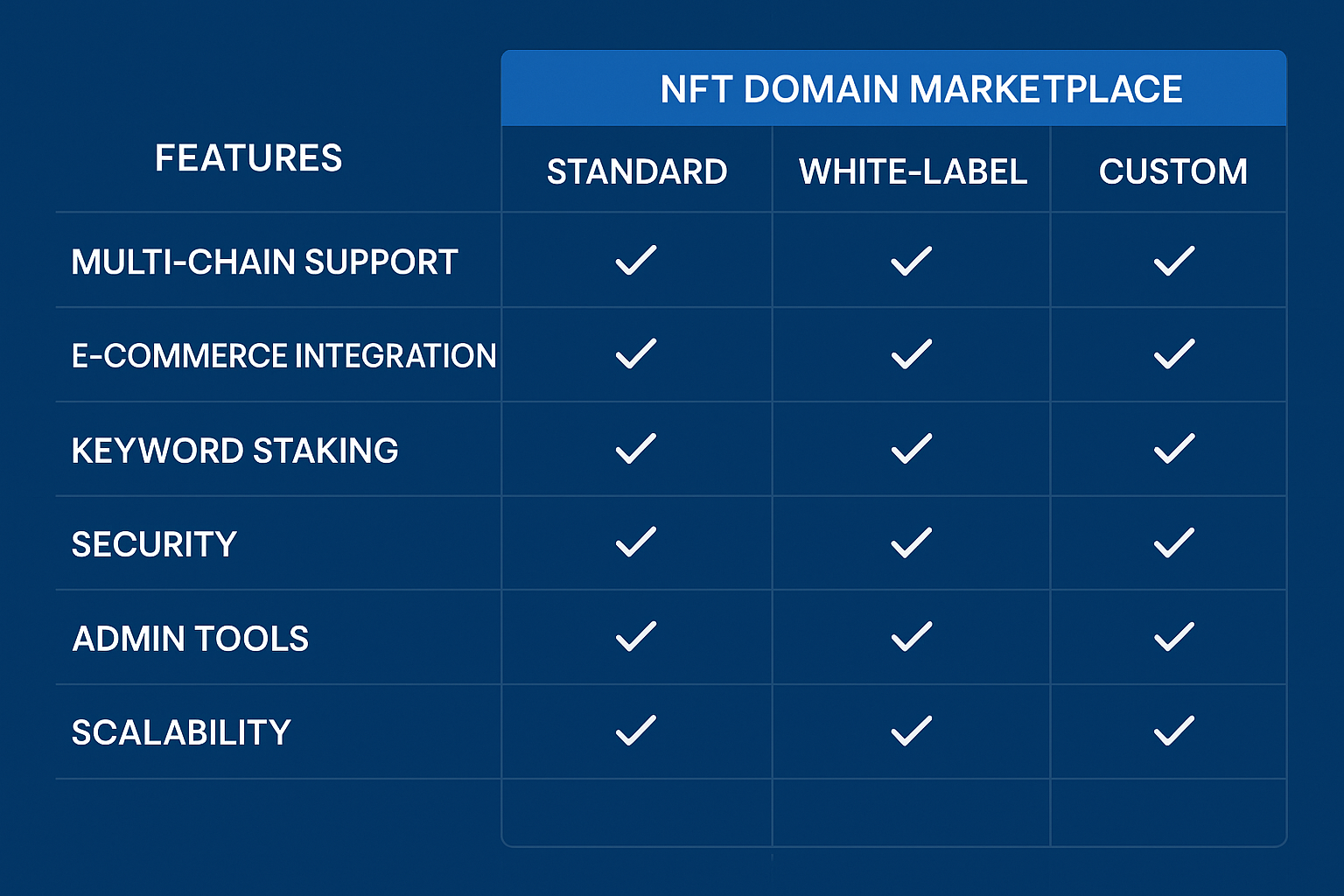
Multi-Chain Support
Multi-chain support enables the marketplace to operate across different blockchain networks, increasing liquidity and user reach. Brands can list and manage NFT domains on Ethereum, Binance Smart Chain, Polygon, and other chains, providing flexibility and future-proofing their investments.
Web3 Keyword Staking Integration
Keyword staking platforms integrated within NFT domain marketplaces allow brands to stake tokens on specific keywords, boosting visibility and search prioritization. This innovative feature enhances marketing ROI by leveraging decentralized search mechanics and user engagement incentives.
Marketplace E-commerce Capabilities
E-commerce features facilitate seamless domain purchases, auctions, and payment processing within the marketplace. Integration with popular wallets and payment gateways ensures smooth user experiences and supports various transaction models including fixed-price sales and bidding.
Feature Comparison Table
| Feature | Standard Marketplace | White-Label Marketplace | Custom Solution |
|---|---|---|---|
| Multi-Chain Support | Limited | Extensive | Tailored |
| E-commerce Integration | Basic | Advanced | Customizable |
| Keyword Staking | Rare | Integrated | Custom Built |
| Security Features | Standard | Enhanced | Enterprise Grade |
| Admin Tools | Minimal | Comprehensive | Fully Custom |
| Scalability | Moderate | High | Flexible |
How Web3 Keyword Staking Drives Marketing Visibility
Keyword staking in Web3 e-commerce is a decentralized mechanism where brands stake tokens on targeted keywords to increase visibility and priority in search results. This approach replaces traditional keyword bidding with transparent, blockchain-based staking, enhancing brand exposure and protecting valuable keywords from competitors.
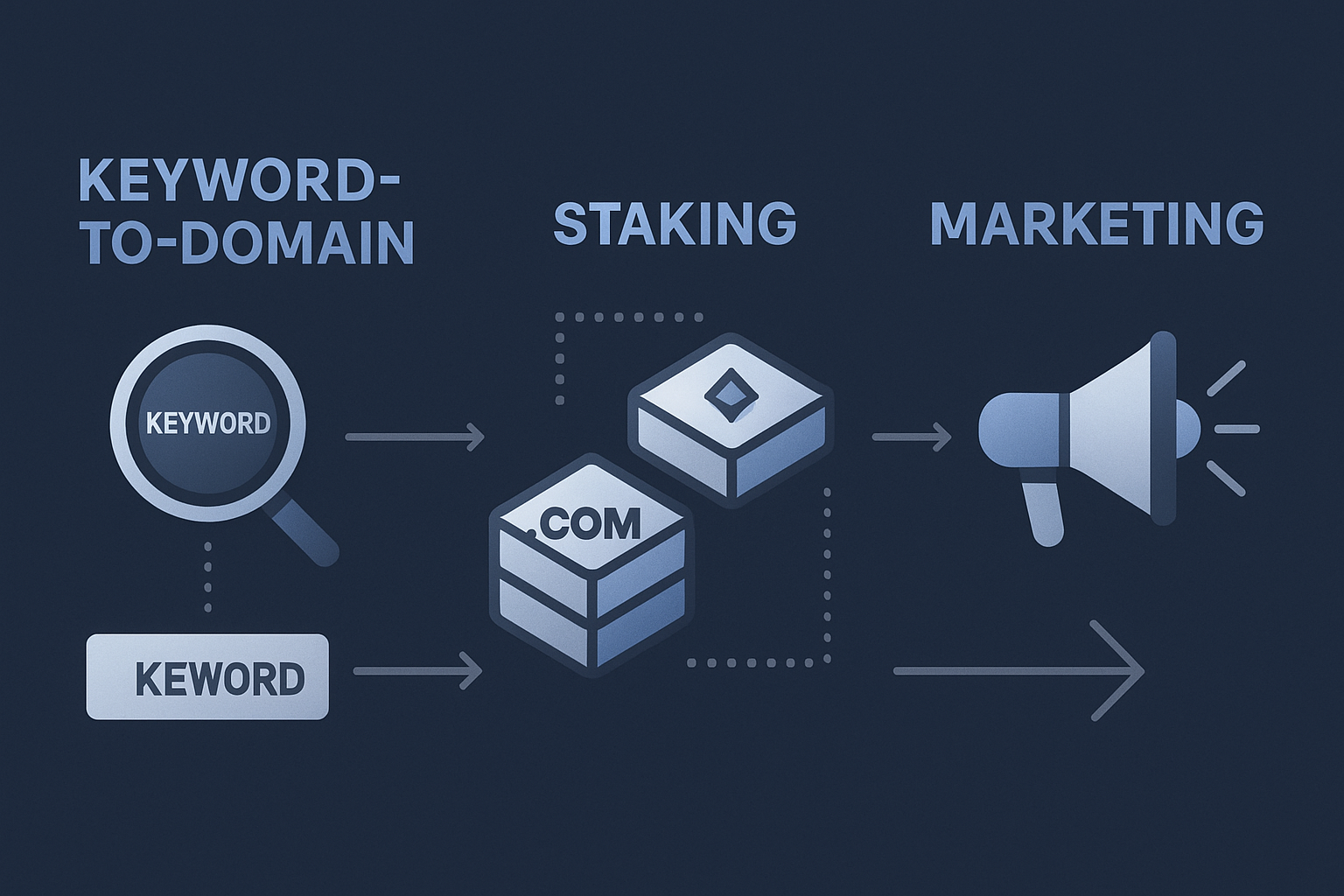
Integrating keyword staking with NFT domain marketplaces allows marketers to leverage decentralized search algorithms for greater reach and improved ROI. Brands can participate in keyword auctions, stake tokens for exclusive keyword control, and monitor performance through analytics dashboards, optimizing their marketing strategies in real-time.
How Does Keyword Staking Work?
Keyword staking involves locking tokens on specific keywords to gain priority in decentralized search platforms. This process ensures transparency and fairness, as blockchain technology validates staking amounts and ownership, preventing manipulation. Brands gain competitive advantages by controlling keyword placements, driving targeted traffic and increasing conversions.
Web3 Keyword Staking Platform Integration with NFT Domains
NFT domain marketplaces integrate with Web3 keyword staking platforms using APIs and smart contracts, enabling seamless staking, bidding, and management of keyword assets. This integration provides real-time updates on staking status and keyword rankings, empowering brands with actionable insights to refine their marketing efforts and maximize visibility.
Multi-Chain Marketplace Aggregators: The Future-Proof Solution
Multi-chain NFT domain marketplace aggregators consolidate listings and management across various blockchain networks, simplifying user interactions and expanding market access. They address fragmentation by providing a unified platform where users can list, buy, and transfer NFT domains seamlessly across chains like Ethereum, Binance Smart Chain, Polygon, and Solana.
For brands, multi-chain aggregators future-proof their NFT domain investments by ensuring interoperability, broader user reach, and reduced operational complexity. Technical features include cross-chain listings, bulk management tools, and price comparison functionalities, enhancing decision-making and user experience.
What is Multi-Chain Aggregation?
Multi-chain aggregation refers to the consolidation of NFT domain marketplace activities across multiple blockchain ecosystems into a single platform. This allows users to manage assets without switching between chains or platforms, facilitating smoother transactions and greater liquidity.
Benefits for Brands: Multi-Chain Domain Access
Brands benefit from multi-chain access by reaching diverse blockchain user bases, reducing dependency on a single chain, and leveraging cross-chain tools for marketing and sales. This approach enhances resilience and scalability, ensuring brands remain competitive as new blockchains emerge.
Success Story: How Brands Thrive with White-Label NFT Domain Marketplaces
A notable case study is XYZ Protocol, which launched a white-label NFT domain marketplace featuring multi-chain support and staking integration. After deployment, the platform saw a 40% increase in user engagement and significant growth in domain sales. This success demonstrates the value of combining technical sophistication with brand customization.
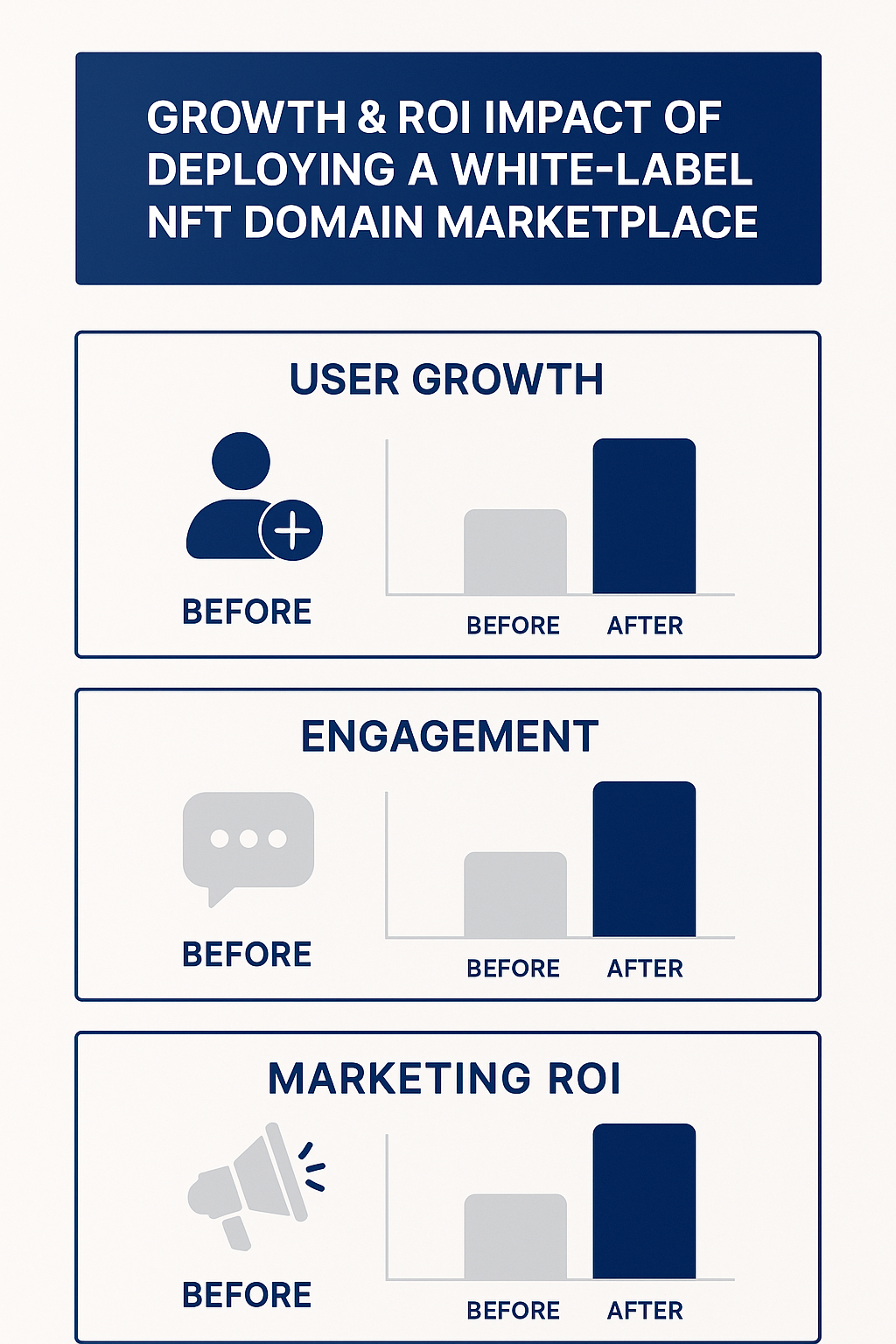
Brands adopting white-label NFT marketplaces report improved brand visibility, customer retention, and marketing ROI. Best practices include leveraging staking features, focusing on user experience, and integrating analytics to monitor performance and optimize strategies continuously.
Case Study: XYZ Protocol
XYZ Protocol’s white-label marketplace successfully combined multi-chain NFT domains with staking features to create a robust platform that attracted a diverse user base and enhanced domain ownership retention.
What Results Can Brands Expect?
Brands can expect increased user engagement, higher domain sales, enhanced brand loyalty, and measurable marketing ROI improvements by adopting white-label NFT domain solutions tailored to their needs.
Frequently Asked Questions (FAQ): White-Label NFT Domain Marketplaces for Brands
What is a white-label NFT domain marketplace? It is a customizable platform enabling brands to launch their own NFT domain marketplaces quickly without building from scratch, offering features like multi-chain support, escrow, and wallet integration.
How can my brand launch a white-label NFT domain marketplace? By partnering with specialized agencies offering white-label solutions, customizing branding elements, configuring domain minting and trading features, and integrating payment and security systems.
What features should I look for in a white-label NFT domain solution? Focus on multi-chain support, security, keyword staking integration, e-commerce capabilities, and admin flexibility to ensure scalability and user satisfaction.
How much does a white-label NFT domain platform cost? Costs vary from $10,000 to over $100,000 depending on features, customization, and support, with ongoing maintenance fees.
Which agencies provide white-label NFT domain marketplace services? Notable providers include Blockchain App Factory, Hivelance, Altura, Antiersolutions, and Creatify, offering customizable, secure, and scalable solutions.
Conclusion
White-label NFT domain marketplaces offer brands a powerful way to establish and control their Web3 identities with speed, security, and customization. By choosing platforms with multi-chain support, keyword staking integration, and user-friendly e-commerce features, brands can future-proof their digital presence and maximize marketing ROI.
Brands and marketing leaders are encouraged to explore white-label solutions and partner with reputable providers to leverage blockchain domains as foundational assets in their Web3 branding strategies. This approach ensures sustainable growth, customer loyalty, and competitive advantage in the evolving decentralized digital economy.
References
- What is a White-Label NFT Domain Marketplace?
- How can my brand launch a white-label NFT domain marketplace?
- What features to look for in a white-label NFT domain solution?
- How much does a white-label NFT domain platform cost?
- Which agencies provide white-label NFT domain marketplace services?
- What is keyword staking in Web3 for e-commerce?
- How can e-commerce stores use keyword staking?
- Which platforms offer e-commerce keyword staking?
- What are the ROI metrics for keyword staking in e-commerce?
- How to integrate keyword staking with my online store?
- What is a multi-chain NFT domain marketplace aggregator?
- Which chains are supported by NFT domain marketplace aggregators?
- How to list my NFT domain across multiple chains?
- What are the fees for multi-chain NFT domain aggregators?
- How to compare prices across NFT domain marketplaces?
- blockchain domains
- NFT domain utility
- NFT domain branding
- decentralized domain management
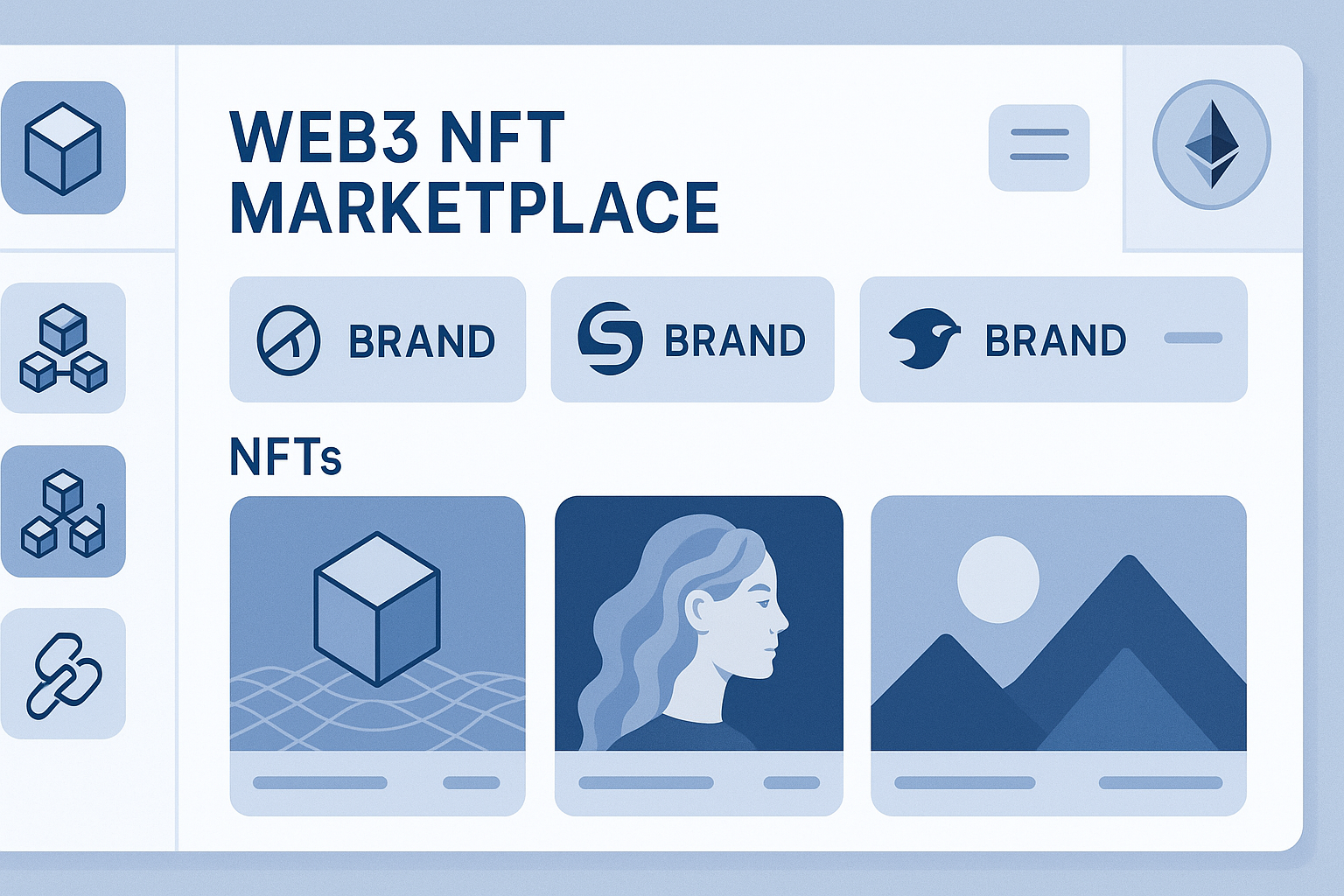
Leave a Reply